|
Books Should Be Free Loyal Books Free Public Domain Audiobooks & eBook Downloads |
|
|
Books Should Be Free Loyal Books Free Public Domain Audiobooks & eBook Downloads |
|
Essay/Short Nonfiction |
|---|
Book type:
Sort by:
View by:
|
By: Jane Austen (1775-1817) | |
|---|---|
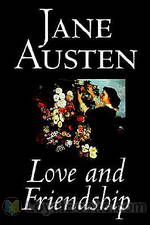 Love and Friendship
Love and Friendship
Begun when she was just eleven years old, Love and Friendship is one of Jane Austen's stories that very few readers may have encountered before. Austen experts feel that this story was written, like many others, only for the pleasure of her family and friends. It is scribbled across three notebooks, in childish handwriting, and the complete work is thought to have been written over a period of six or seven years. It is dedicated to one of her cousins, whom she was very close to, Eliza de Feuillide... | |
By: Leo Tolstoy (1828-1910) | |
|---|---|
 Tolstoy on Shakespeare
Tolstoy on Shakespeare
This book contains a critical essay on Shakespeare by Leo Tolstoy. It is followed by another essay named "Shakespeare's attitude to the working classes" by Ernest Crosby and extracts of a letter by George Bernard Shaw. | |
By: Mark Twain (1835-1910) | |
|---|---|
 Alonso Fitz and Other Stories
Alonso Fitz and Other Stories
A collection of Twain short stories including:The Loves Of Alonzo Fitz Clarence And Rosannah EtheltonOn The Decay Of The Art Of LyingAbout Magnanimous-Incident Literature The Grateful Poodle The Benevolent Author The Grateful HusbandPunch, Brothers, PunchThe Great Revolution In PitcairnThe Canvasser's TaleAn Encounter With An InterviewerParis NotesLegend Of Sagenfeld, In GermanySpeech On The BabiesSpeech On The WeatherConcerning The American LanguageRogers | |
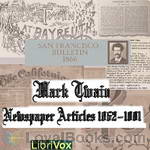 Newspaper Articles by Mark Twain
Newspaper Articles by Mark Twain
This is a collection of newspaper articles written by Samuel Clemens, for various newspapers, between 1862 and 1881. After Feb 3rd 1863, he began using the pen name Mark Twain. This compilation is the work of Project Gutenberg and contains articles from TERRITORIAL ENTERPRISE, THE SAN FRANCISCO DAILY MORNING CALL, THE SACRAMENTO DAILY UNION, DAILY HAWAIIAN HERALD, ALTA CALIFORNIA, THE CHICAGO REPUBLICAN, and THE GALAXY. (Introduction by John Greenman) | |
 What is Man? and Other Essays
What is Man? and Other Essays
"What Is Man?", published by Mark Twain in 1906, is a dialogue between a young man and an older man jaded to the world. It involves ideas of destiny and free will, as well as of psychological egoism. The Old Man asserted that the human being is merely a machine, and nothing more. The Young Man objects, and asks him to go into particulars and furnish his reasons for his position. This collection of short stories covers a wide range of Twain's interests: the serious, the political and the ironically humorous. | |
 Fenimore Cooper's Literary Offences
Fenimore Cooper's Literary Offences
This is Mark Twain's vicious and amusing review of Fenimore Cooper's literary art. It is still read widely in academic circles. Twain's essay, Fenimore Cooper's Literary Offenses (often spelled "Offences") (1895), particularly criticized The Deerslayer and The Pathfinder. Twain wrote at the beginning of the essay: 'In one place in Deerslayer, and in the restricted space of two-thirds of a page, Cooper has scored 114 offenses against literary art out of a possible 115. It breaks the record.' Twain listed 19 rules 'governing literary art in domain of romantic fiction', 18 of which Cooper violates in The Deerslayer. (Introduction by Wikipedia and John Greenman) | |
 The Curious Republic of Gondour and Other Whimsical Sketches
The Curious Republic of Gondour and Other Whimsical Sketches
As the title reveals, these stories are a collection of some of Mark Twain's more fanciful and eccentric works. They run the gamut from political commentary to our species' need to "be remembered" somehow. Taken as a whole the stories are "whimsical". Taken individually, they speak the truth in different ways. (Introduction by John Greenman) | |
 In Defense of Harriet Shelley
In Defense of Harriet Shelley
Mark Twain pulls no punches while exposing the "real" Percy Shelley in this scathing condemnation of Edward Dowden's "Life of Shelley". Even though, as Twain writes, "Shelley's life has the one indelible blot upon it, but is otherwise worshipfully noble and beautiful", Twain shows how Shelley's extra-marital conduct might easily be seen to have been the cause of his wife Harriet's suicide. (Introduction by John Greenman) | |
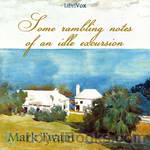 Some Rambling Notes of an Idle Excursion
Some Rambling Notes of an Idle Excursion
Written for the Atlantic magazine in 1877, this is a collection of stories about a trip Mark Twain made with some friends to Bermuda. It contains fascinating descriptions of Bermuda the island, and some of its people as well as an explanation of why Bermuda's houses are "so white". | |
 How to Tell a Story, and Other Essays
How to Tell a Story, and Other Essays
In his inimitable way, Mark Twain gives sound advice about how to tell a story, then lets us in on some curious incidents he experienced, and finishes with a trip that proves life-changing. | |
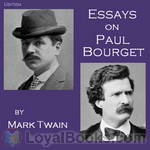 Essays on Paul Bourget
Essays on Paul Bourget
Collection of short essays concerning French novelist and critic Paul Bourget. Included: "What Paul Bourget Thinks of Us" and "A Little Note to M. Paul Bourget". | |
 Mark Twain's Speeches
Mark Twain's Speeches
Spanning the time between 1872 and the year before he died, this collection of after-dinner speeches, random thoughts to "the press", etc. clearly documents, once again, the truly eclectic mind of Samuel Clemens. It also demonstrates how he dealt with adulation, compliments and notoriety...head on! This collection is a treasure-trove of Twain sayings, witticisms and pronouncements on a huge galaxy of issues and concerns in his life. | |
By: Charles Dickens | |
|---|---|
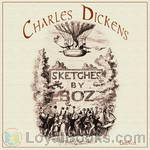 Sketches by Boz: Illustrative of Every-Day Life and Every-Day People
Sketches by Boz: Illustrative of Every-Day Life and Every-Day People
"Sketches by "Boz," Illustrative of Every-day Life and Every-day People (commonly known as Sketches by Boz) is a collection of short pieces published by Charles Dickens in 1836 accompanied by illustrations by George Cruikshank. The 56 sketches concern London scenes and people and are divided into four sections: "Our Parish", "Scenes", "Characters", and "Tales". The material in the first three of these sections is non-fiction. The last section comprises fictional stories. Originally, the sketches were published in various newspapers and periodicals from 1833-1836." | |
 The Uncommercial Traveller
The Uncommercial Traveller
The Uncommercial Traveller is a collection of literary sketches and reminiscences written by Charles Dickens. In 1859 Dickens founded a new journal called All the Year Round and the Uncommercial Traveller articles would be among his main contributions. He seems to have chosen the title and persona of the Uncommercial Traveller as a result of a speech he gave on the 22 December 1859 to the Commercial Travellers' School London in his role as honorary chairman and treasurer. The persona sits well with a writer who liked to travel, not only as a tourist, but also to research and report what he found; visiting Europe, America and giving book readings throughout Britain... | |
By: Henrietta Elizabeth Marshall (1867-1941) | |
|---|---|
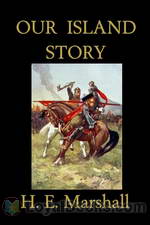 Our Island Story
Our Island Story
Tailored specially to make history more palatable and interesting to children, Our Island Story, by Henrietta Elizabeth Marshall, is a charmingly illustrated volume that promises hours of delight for parents as well as children. Beginning with the myths and legends about Albion, the author ensures that she captivates the child's imagination from the very first page. Unlike today's dry and non-committal history tomes that are prescribed in schools, Our Island Story is full of lyrical prose, literary allusions, heroic and tragic characters, the hunger for power and the glory of empire... | |
By: Robert Louis Stevenson | |
|---|---|
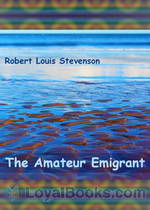 The Amateur Emigrant
The Amateur Emigrant
In July 1879, Robert Louis Stevenson left Scotland to meet his future wife in her native California. Leaving by ship from Glasgow, Scotland, he determined to travel in steerage class to see how the working classes fared. At the last minute he was convinced by friends to purchase a ticket one grade above the lowest price, for which he was later thankful after seeing the conditions in steerage, but he still lived among the ‘lower’ classes. His comments on the experience make interesting reading. His father however was so shocked at the thought of his son associating with people ‘beneath him’ that the work was not published for a number of years, | |
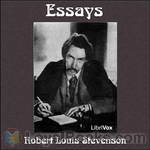 Essays of Robert Louis Stevenson
Essays of Robert Louis Stevenson
“Extreme busyness…is a symptom of deficient vitality; and a faculty for idleness implies a catholic appetite and a strong sense of personal identity.” What comforting words for the idle among us! Like many of the best essayists, Stevenson is very much the genial fireside companion: opinionated, but never malicious; a marvellous practitioner of the inclusive monologue. In this collection of nine pieces he discusses the art of appreciating unattractive scenery, traces the complex social life of dogs, and meditates in several essays upon the experience of reading literature and writing it... | |
By: H. G. Wells (1866-1946) | |
|---|---|
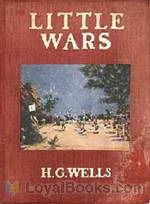 Little Wars (A Game for Boys)
Little Wars (A Game for Boys)
Miniature wargaming got its start with the publication in 1913 of this thoroughly entertaining little account of how H.G. Wells, with certain of his friends, took their childhood toys and turned play into acceptable middle-aged sport by subjecting the exercise to the civilizing influence of actual rules. While wargaming progressed far past these beginnings, Wells observes how “little wars” with even his elementary rules can suggest the wholesale crudity of the real thing. “You have only to play at Little Wars three or four times to realise just what a blundering thing Great War must be... | |
By: Jack London (1876-1916) | |
|---|---|
 Valley of the Moon
Valley of the Moon
The novel Valley of the Moon is a story of a working-class couple, Billy and Saxon Roberts, struggling laborers in Oakland at the Turn-of-the-Century, who left the city life behind and searched Central and Northern California for a suitable farmland to own. The book is notable for the scenes in which the proletarian hero enjoys fellowship with the artists' colony in Carmel, and he settles in the Valley of the Moon. | |
By: Rudyard Kipling (1865-1936) | |
|---|---|
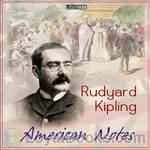 American Notes
American Notes
In American Notes, Rudyard Kipling, the Nobel Prize-winning author of the Jungle Book, visits the USA. As the travel-diary of an Anglo-Indian Imperialist visiting the USA, these American Notes offer an interesting view of America in the 1880s. Kipling affects a wide-eyed innocence, and expresses astonishment at features of American life that differ from his own, not least the freedom (and attraction) of American women. However, he scorns the political machines that made a mockery of American democracy, and while exhibiting the racist attitudes that made him controversial in the 20th century concludes “It is not good to be a negro in the land of the free and the home of the brave... | |
By: Kenneth Grahame (1859-1932) | |
|---|---|
 The Golden Age
The Golden Age
If you've loved and cherished The Wind in The Willows, you'll be delighted to read The Golden Age. In this book of reminiscences by Kenneth Grahame, the much loved creator of Winnie The Pooh, readers are granted an insight into the writer's childhood. The opening lines of the Prologue provide a poignant reminder of Grahame's childhood. When he was just five, his mother died in childbirth and his father who had a long standing problem with alcoholism consigned his four children, including the newborn baby, to the care of their grandmother in Berkshire... | |
By: Alexandre Dumas (1802-1870) | |
|---|---|
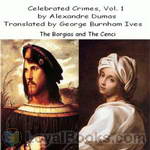 Celebrated Crimes
Celebrated Crimes
Dumas's 'Celebrated Crimes' was not written for children. The novelist has spared no language -- has minced no words -- to describe the violent scenes of a violent time.In some instances facts appear distorted out of their true perspective, and in others the author makes unwarranted charges. The careful, mature reader, for whom the books are intended, will recognize, and allow for, this fact.The first volume comprises the annals of the Borgias and the Cenci. The name of the noted and notorious Florentine family has become a synonym for intrigue and violence, and yet the Borgias have not been without stanch defenders in history... | |
By: Oscar Wilde (1854-1900) | |
|---|---|
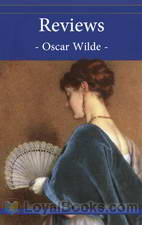 Reviews
Reviews
Wilde’s literary reputation has survived so much that I think it proof against any exhumation of articles which he or his admirers would have preferred to forget. As a matter of fact, I believe this volume will prove of unusual interest; some of the reviews are curiously prophetic; some are, of course, biassed by prejudice hostile or friendly; others are conceived in the author’s wittiest and happiest vein; only a few are colourless. And if, according to Lord Beaconsfield, the verdict of a continental nation may be regarded as that of posterity, Wilde is a much greater force in our literature than even friendly contemporaries ever supposed he would become... | |
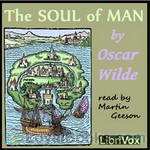 The Soul of Man
The Soul of Man
“(T)he past is what man should not have been. The present is what man ought not to be. The future is what artists are.”Published originally as “The Soul of Man Under Socialism,” this is not so much a work of sober political analysis; rather it can be summed up as a rhapsodic manifesto on behalf of the Individual. Socialism having deployed technology to liberate the whole of humanity from soul-destroying labour, the State obligingly withers away to allow the free development of a joyful, anarchic hedonism... | |
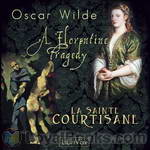 A Florentine Tragedy and La Sainte Courtisane
A Florentine Tragedy and La Sainte Courtisane
Two short fragments: an unfinished and a lost play. A Florentine Tragedy, left in a taxi (not a handbag), is Wilde’s most successful attempt at tragedy – intense and domestic, with surprising depth of characterisation. It was adapted into an opera by the Austrian composer Alexander Zemlinsky in 1917. La Sainte Courtisane, or The Woman Covered in Jewels explores one of Wilde’s great idées fixes: the paradox of religious hedonism, pagan piety. Both plays, Wildean to their core, revel in the profound sadness that is the fruit of the conflict between fidelity and forbidden love... | |
By: G. K. Chesterton | |
|---|---|
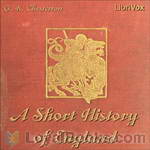 A Short History of England
A Short History of England
Gilbert Keith Chesterton was a prolific writer on many topics. His views of history were always from the standpoint of men and their interactions, and it may fairly be said he saw all of history as a battle between civilization and barbarism. So it has always been, and that remains true even today.“But it is especially in the matter of the Middle Ages that the popular histories trample upon the popular traditions. In this respect there is an almost comic contrast between the general information... | |
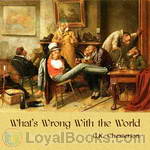 What's Wrong With the World
What's Wrong With the World
Gilbert Keith Chesterton (1874–1936) has been called the “prince of paradox.” Time magazine observed of his writing style: “Whenever possible Chesterton made his points with popular sayings, proverbs, allegories—first carefully turning them inside out.” His prolific and diverse output included journalism, philosophy, poetry, biography, Christian apologetics, fantasy and detective fiction. The title of Chesteron’s 1910 collection of essays was inspired by a title given to him two years earlier by The Times newspaper, which had asked a number of authors to write on the topic: “What’s wrong with the world?”... | |
 Eugenics and Other Evils
Eugenics and Other Evils
Most Eugenists are Euphemists. I mean merely that short words startle them, while long words soothe them. And they are utterly incapable of translating the one into the other, however obviously they mean the same thing. Say to them “The persuasive and even coercive powers of the citizen should enable him to make sure that the burden of longevity in the previous generation does not become disproportionate and intolerable, especially to the females”; say this to them and they will sway slightly to and fro like babies sent to sleep in cradles. Say to them “Murder your mother,” and they sit up quite suddenly. Yet the two sentences, in cold logic, are exactly the same.” | |
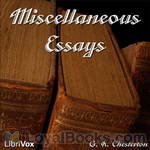 Miscellaneous Essays
Miscellaneous Essays
These nine files are miscellaneous short essays or stories from G. K. Chesterton. They were chosen for not only their brevity but also for being shining exemplars of Chesterton’s wit and whimsy. A fun but powerful introduction into the mind of the man that is G. K. Chesterton. | |
 Alarms and Discursions
Alarms and Discursions
Gilbert Keith Chesterton was an influential English writer of the early 20th century. His prolific and diverse output included journalism, philosophy, poetry, biography, Christian apologetics, fantasy, and detective fiction. Chesterton has been called the “prince of paradox.” He wrote in an off-hand, whimsical prose studded with startling formulations. Chesterton wrote about 4000 essays on various subjects, and “Ararms and Discursions is one of his collections. | |
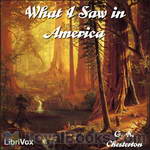 What I Saw in America
What I Saw in America
“Let me begin my American impressions with two impressions I had before I went to America. One was an incident and the other an idea; and when taken together they illustrate the attitude I mean. The first principle is that nobody should be ashamed of thinking a thing funny because it is foreign; the second is that he should be ashamed of thinking it wrong because it is funny.” (Gilbert Keith Chesterton) | |
 The New Jerusalem
The New Jerusalem
“On the road to Cairo one may see twenty groups exactly like that of the Holy Family in the pictures of the Flight into Egypt; with only one difference. The man is riding on the ass.” “The real mistake of the Muslims is something much more modern in its application than any particular passing persecution of Christians as such. It lay in the very fact that they did think they had a simpler and saner sort of Christianity, as do many modern Christians. They thought it could be made universal merely by being made uninteresting... | |